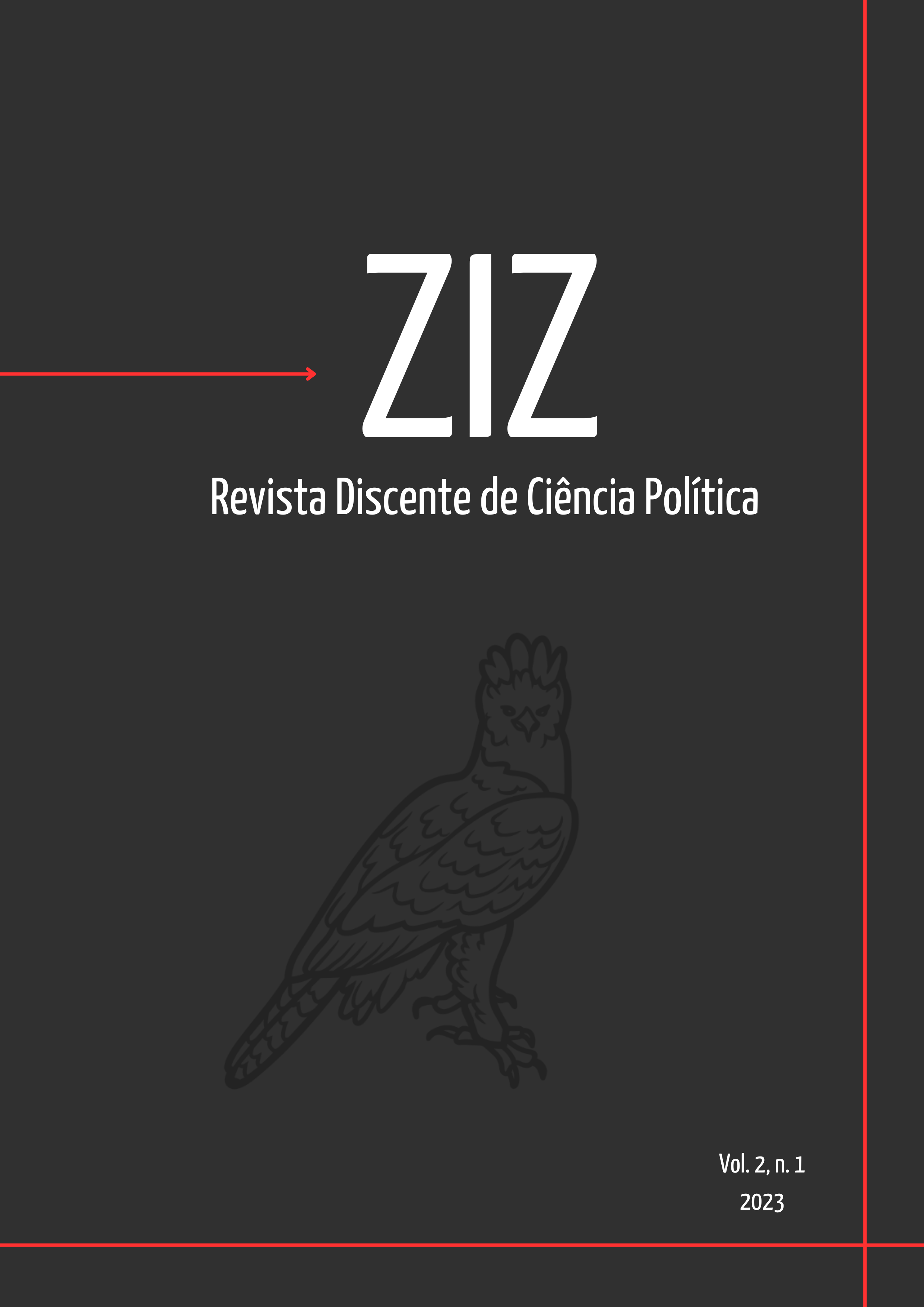A Reconfiguração da Democracia na Era Digital
O impacto das plataformas digitais sobre o processo eleitoral
DOI:
https://doi.org/10.22409/ziz.v2i1.58956Palavras-chave:
Ciberdemocracia, Plataformização, Instituições DemocráticasResumo
Não existe conceituação pacífica na literatura sobre o que concerne ser uma democracia, sendo definida a depender da perspectiva teórica ou analítica. Todavia, o papel do cidadão, da escolha do governo e responsividade deste perante àqueles perpassa a maioria delas. Partindo disso, na Era Digital, com o advento das plataformas e da acelerada propagação de informação (e desinformação), percebe-se que houve impacto para os regimes democráticos e os elementos citados na qualidade democrática. Diante disso, a presente a presente pesquisa tem o objetivo geral de avaliar o impacto das plataformas da Internet, e a regulação ou não governamental sobre elas, no processo eleitoral dos países. Para cumprir com esse escopo, o percurso metodológico partiu de um ensaio teórico sobre o que é o regime democrático, com foco nos autores processualistas a partir da revisão bibliográfica e documental sobre a conceituação de democracia e o fenômeno da desinformação, o qual é amplificado pelas mídias e plataformas digitais. Seguindo para criação de um modelo a partir de um banco de dados criados com coleta de dados secundários, para ser realizada a análise descritiva dos casos. Essa temática emergente torna-se cada vez mais relevante conforme se observa quanto a propagação de conteúdo nas plataformas online revolucionou a comunicação e, consequentemente, o debate democrático.
Downloads
Referências
BOARINI, Margareth; FERRARI, Pollyana. A desinformação é o parasita do século. Revista Organic, [S.l.]. V. 7. n. 13. 2021. P. 37 - 47. DOI: 10.11606/issn.2238-2593.organicom.2021.170549.
BRUZZONE, Andrés. Ciberpopulismo: política e democracia no mundo digital. São Paulo: Contexto, 2021.
CASTELLS, Manuel. The power of identity, the information age: Economy, Society and Culture. Oxford: Wiley-Blackwell, 2010.
DALH, Robert. Poliarquia: participação e oposição. São Paulo: Editora da Universidade de São Paulo, 2005.
DI FELICE, Massimo. Do público para as redes. São Caetano do Sul: Difusão, 2008.
DOWNS, Anthony. Uma Teoria Econômica da Democracia. São Paulo: Editora da Universidade de São Paulo, 2013
DOWNS, Anthony. Uma Teoria Econômica da Democracia. São Paulo: Editora da Universidade de São Paulo, 1999.
DUTRA, Deo Campos; OLIVEIRA, Eduardo. Ciberdemoracia: A internet como ágora digital. Revista Direitos Humanos e Democracia. Vol. 6. n. 11. 2018. P. 134 - 166. DOI: https://doi.org/10.21527/2317-5389.2018.11.134-166
FARIAS, Luiz Alberto de; LOPES, Valéria de Siqueira Castro. Transbordo de desinformação. Revista Organicom, [S.l.] V. 17. n. 34. 2021. P. 11 - 12. DOI: 10.11606/issn.2238-2593.organicom.2021.181377.
FERRARI, Pollyana. Como sair das bolhas. São Paulo: Educ, 2018.
FREEDOM HOUSE. Election Watch For The Digital Age: Tracking the intersection of elections, internet platforms, and human rights Around the world. 2022. Disponível em: https://freedomhouse.org/report/election-watch-digital-age. Acesso em nov. 2022.
HUNTINGTON, Samuel. The Third Wave, Democratization in the Late Twentieth Century. Norman: University of Oklahoma Press, 1991.
KEGLER, Bruno; POZOBON, Rejane de Oliveira. Fake News, pós-verdade e os limites (ou desafios) da opinião pública na sociedade da plataforma. Revista Organicom, [S.l.]. V. 17. n. 34. P. 48 - 57. DOI: 10.11606/issn.2238-2593.organicom.2021.170515.
KOSINSKI, Michael; RUST, John. Modern Psychometrics: The Science of Psychological Assessment. 4ª ed. Standfor: Routledge, 2020.
LESSA, Maria Eduarda Regueira Navarro. Uma live com hackers: a relação entre confiança na mídia, nas eleições e a participação política. Dissertação (Mestrado em Ciência Política) – Universidade Federal de Pernambuco, Centro de Filosofia e Ciências Humanas, Programa de Pós-Graduação em Ciência Política. P. 1 - 87. 2021.
LÉVY, Pierre. Ciberdemocracia: ensayo sobre filosofia política. Barcelona: Editora UOC, 2004.
MAINWARING, Scott; BRINKS, Daniel. PÉREZ-LIÑÁN, Aníbal. Classificando Regimes Políticos na América Latina, 1945-1999. DADOS – Revista de Ciências Sociais, Rio de Janeiro. Vol. 44, n. 4. 2001. Rio de Janeiro. P. 645 - 687.
MIGUEL, Luís Felipe. Teoria Democrática Atual: Esboço de Mapeamento. BIB. São Paulo, n° 59, Io semestre de 2005, Págs. 5 a 42.
O ́DONNELL, Guillermo. Teoria Democrática e Política Comparada. Revista Dados. V. 42. N. 4. 1999. Rio de Janeiro.
PRZEWORSKI, Adam. Crises da democracia. Rio de Janeiro: Zahar, 2020.
ROUSSEAU, Jan Jacs. O contrato social. São Paulo: Martins Fontes, 1999.
SCHUMPETER, Joseph. Capitalismo, socialismo e democracia. Rio de Janeiro: Fundo de Cultura, 1961.
SHAHBRAZ, Adrian; FUNK, Allie. The Crisis of Social Media. Freedom on the Net 2019. 2020. Disponível em: https://freedomhouse.org/report/freedom-net/2019/crisis-social-media. Acesso em nov. 2022.
THE ECONOMIST. A new low for global democracy. 2022. Disponível em: https://www.economist.com/graphic-detail/2022/02/09/a-new-low-for-global-democracy. Acesso em nov. 2022.
TROUNG, Mai; et.all. Manipulating Social Media to Undermine Democracy. Freedom on the Net 2017. 2018. Disponível em: https://freedomhouse.org/report/freedom-net/2017/manipulating-social-media-undermine-democracy. Acesso em nov. 2022
VAN DIJCK, José; POELL, Thomas; DE WAAL, Martijn. The Platform Society: Public Values in a Connective World. USA: Oxford University Press, 2018.
Downloads
Publicado
Edição
Seção
Licença
Copyright (c) 2023 ZIZ - Revista Discente de Ciência Política

Este trabalho está licenciado sob uma licença Creative Commons Attribution 4.0 International License.



